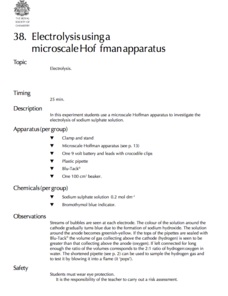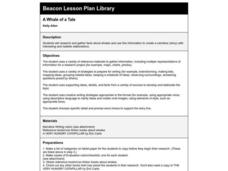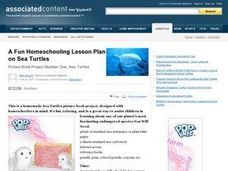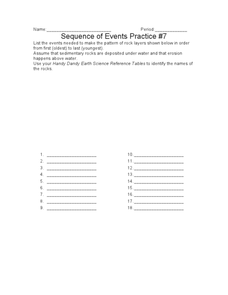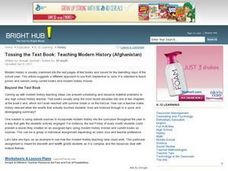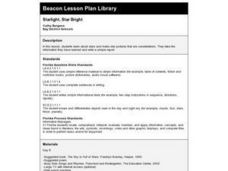Baylor College
Your Nutrition Needs
It takes some work to ensure you have a balanced diet, but once you know the types of foods that are good for you, it becomes second nature. In the sixth of seven lessons about energy and nutrition, learners create a healthy eating plan...
Polk Bros Foundation
Answer the BIG Question with Cited Examples and Evidence
Close up your unit of study with an examination of one of the guiding or essential questions as it relates to what your class has studied and other research. Class members first write down the question. Then they note down information...
Energy for Keeps
The Energy Times
Extra! Extra! Read all about past and present energy use in a classroom-made historical newspaper. Useful as a cross-curricular assignment between science, history, and language arts, the project is sure to get young journalists...
Chicago Botanic Garden
Causes and Effects of Climate Change
It's time for your class to literally show what they know! Pupils illustrate what they learned about the causes and effects of climate change by filling out a graphic organizer to complete the 5-part series of lessons. They discuss them...
National Wildlife Federation
Yesterday: Our Energy Needs Over Time
How has our relationship to energy changed over time? An engaging exploration challenges learners to create a timeline showing human energy needs and uses over time. Scholars review what timelines are, choose a 50-year period in history...
Prestwick House
A Raisin in the Sun
Or does it explode? Discuss the ultimate deferred dream in Lorraine Hansberry's A Raisin in the Sun with a handy crossword puzzle that reviews key names and details from the play.
Royal Society of Chemistry
Electrolysis Using a Microscale Hoffman Apparatus—Microscale Chemistry
Get big results out of a small-scale lab! Young chemists observe the electrolysis of sodium sulfate using a microscale experiment. A colorful indicator solution combined with the production of gas bubbles yields a variety of observations...
Great Books Foundation
Rattlesnakes
John Muir may be a friend to the natural world, but as a short reading passage confirms, he is no friend to rattlesnakes. As young readers learn about Muir's encounters with the dangerous creatures, they answer four comprehension...
Great Books Foundation
The Glass of Milk
It's not easy to ask for help. Learn why a boy on a ship struggles with accepting help in "The Glass of Milk," a short story by Manuel Rojas. Six discussion questions prompt class members to make inferences from the text about character...
Great Books Foundation
On the Origin of Species
How did Charles Darwin support his controversial theory of evolution with evidence? Use an excerpt from his 1859 work On the Origin of Species to reinforce the importance of making inferences within an informational text, and to...
Curated OER
Arkansas Geographical Facts
Students participate in class research and discussion to discover 10 geographical facts about the state of Arkansas. After finding these facts, students complete a book of Arkansas Geographical Records.
Curated OER
Nature Calendar
Students practice using reference materials to locate information by making a nature calendar.
Curated OER
A Whale of a Tale
Students read "A Very Hungry Caterpillar" and discuss factual information in the book. They research whales and use information to write a narrative story. They take their stories through the writing process.
Curated OER
Homeschooling Lesson: Sea Turtles
Students write down the names of common turtles and observe pictures of various types. For this sea turtles lesson, students review names and features of these animals, label and draw a picture. Students research habitat, migration,...
Curated OER
The Grouchy Ladybug
Young scholars learn about sorting and classifying objects by size while reading Eric Carle's "The Grouchy Ladybug". In this sorting and classifying lesson, students first listen to and interact with the story. They then look at cut-outs...
Curated OER
Stirring up Fractions
Second graders practice unit fractions to identify parts of the whole and parts of a set. They utilize a variety of manipulative's including recipe boxes to get them started stirring up fractions. A multitude of books on fractions are...
Curated OER
Sequence of Events Practice 7-Rock Layers
In this rock layers worksheet, students are given a diagram of rock layers each labeled with a letter. Students identify 18 events in sequential order that occurred to form the layers. They label each type of rock using the reference...
Curated OER
Follow the Drinking Gourd
In this literature instructional activity, 3rd graders refer to the book entitled Follow the Drinking Gourd. Students respond to 15 short answer reading comprehension questions.
Captain Planet Foundation
George Washington Carver and the Sweet Potato
Learn about George Washington Carver's important contributions to agriculture by studying the sweet potato. First graders read about the inventor's observations and prepare sweet potato slips for the class garden. Additionally, they...
Curated OER
Tossing the Text Book: Teaching Modern History
Tenth graders analyze primary sources. In this Current Events lesson, 10th graders write a short two - three paged paper answering a specific question. Students prepare a fact sheet for the class detailing points that support...
Curated OER
Year Book Page Special Shape Collage
Students design a collage of pictures for a yearbook that make a shape. They determine the area of the shape and the price of putting the collage in the yearbook.
Curated OER
EasyData Reference
Learners explore the EasyData. In this secondary mathematics lesson plan, students investigate the screens, menus, and list of types of data collection available with the EasyData.
Curated OER
Easy to Read
Students compare reading passages in paragraph form to book form. They determine that the reading passages on the state assessments are no more difficult than the books they choose to read. They turn their favorite books into reading...
Curated OER
Starlight, Star Bright
First graders read books and use the Internet to identify several constellations and stars in the night sky. They make star pictures and write a class report about the night sky including a title, complete sentences and a cited reference.
Other popular searches
- Using Reference Books
- Types of Reference Books
- Biographical Reference Books
- List of Reference Books
- Library Reference Books
- Science Reference Books
- Physics Reference Books
- Reference Books Lesson Plans
- Reference Books Lessons
- Reference Books on Landforms
- How to Use Reference Books
- Reference Books Worksheets






